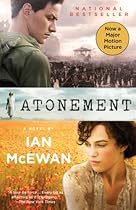
I have a love/hate relationship with this book. I read Atonement by Ian McEwan last weekend. It was one of those books I never really had an intention of reading. I enjoy literature, but most modern literature is pretentious liberal BS. But it was the next book in covered in The Reading Group, so I gave it a try. When I read the jacket flap, I actually got excited about reading it. It sounded like a great story. And I enjoyed the first little bit, but then two things happened. One was that the beginning had eerie commonalities with I Capture the Castle. Not in the whole plot, but in setting, character, atmosphere, and plot pieces. That bugged me because it was a lot of similarities, not just two or three. Three siblings (two girls and a boy)living in a castle/giant English manor, servant boy falls in love with one of the girls, eccentric family members, a virtually absent father, newcomers interrupting the family dynamic, etc. The other thing was that it seems that McEwan likes to read his own words the same way some people like to hear themselves talk. When a sentence will do, he gives you three paragraphs. When a paragraph will do, he gives you three pages. Ugh. If the first 150 pages were condensed to about 50, this would be an excellent, excellent book. I wasn't sure how I was going to make it through the whole thing, the dense, redundant, trying to be philosophical text, but once part one ended, everything picked up. I loved the rest of the book, which was odd since part two is all about the war, which usually doesn't interest me. I found that whole section fascinating, and since Robbie was the only character who I didn't want to kill for being horrendously annoying in the first part, I was glad to see him narrating the entire section. I cared about what happened to him, and through that began to care what happened to Cecilia. And I enjoyed part three even though I hate Briony. Passionately hate her. Imagined her dying wonderful deaths kind of hated her. I hated that she thought she could atone for her sins by just writing them down, like that makes everything okay. But then I thought about how I do that. When something goes wrong, I write. The one thing I truly regret in my life and would go back and change - I write about it. I see myself trying to receive atonement by putting pen to paper (or hands to keyboard), but I know that can't fix anything. It can take guilt out of your mind, at least temporarily. And it can help you visualize what you would do differently, tell your story so you don't do it again, figure out what went wrong. This book stuck with me all week. That's something a lot of books don't do, even good ones. I suppose that makes this a great book, even though I still have a love/hate relationship with it. I would recommend it though, and say that getting through part one is worth it in the end.
Also, I really loved this quote by Robbie, who wants to become a doctor: "he would be a better doctor for having read literature." I loved that quote, no hating involved! You can be a better anything for having read literature.
No comments:
Post a Comment